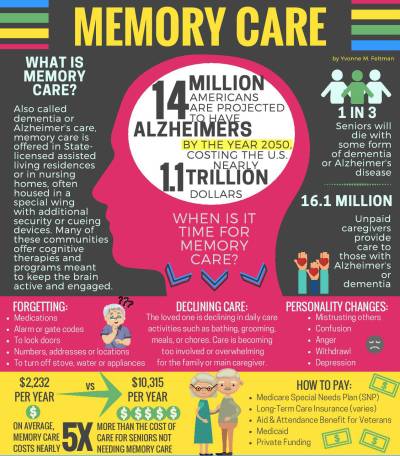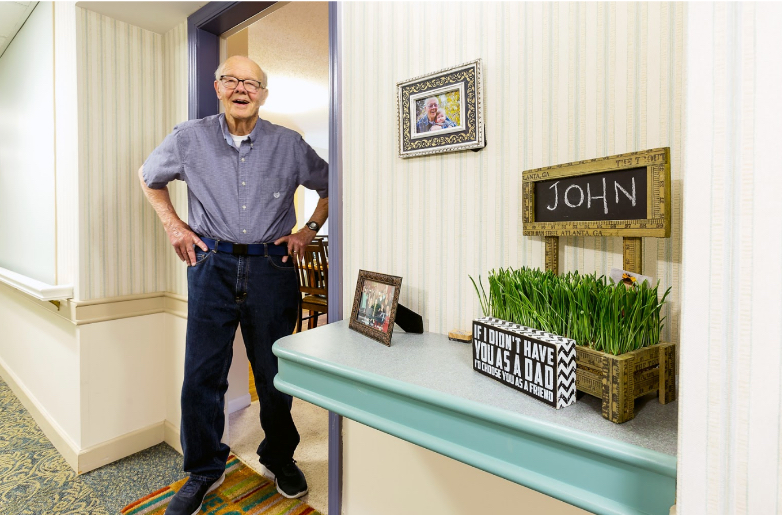Small Memory Carehomes Charlotte: A Compassionate Alternative
Wiki Article
All Regarding Memory Care Services: Why Tiny Memory Treatment Houses Are a Great Option
Memory care solutions play a vital function in supporting people with Alzheimer's and mental deterioration. Little memory treatment homes stand out for their personalized technique and intimate setup. With reduced staff-to-resident proportions, these homes foster more powerful connections and tailored care. Homeowners gain from boosted social interactions and a safe environment. As family members explore alternatives, understanding the distinct advantages of tiny memory care homes ends up being vital. What elements should be taken into consideration when selecting the ideal home?Comprehending Memory Care Solutions
While numerous might be familiar with basic elderly care choices, understanding memory care solutions is vital for families encountering the obstacles of cognitive decline. Memory care particularly accommodates individuals with problems such as Alzheimer's condition and various other kinds of dementia. These services provide a structured atmosphere that concentrates on improving the lifestyle for locals with specialized care and support.Memory care facilities are designed to assure safety and safety, usually featuring safeguarded settings to protect against wandering. Educated employee are offered all the time to aid with day-to-day tasks, drug administration, and personal treatment. Furthermore, memory care programs usually consist of cognitive stimulation activities, tailored to involve locals and advertise psychological wellness. Households can profit from comprehending these solutions, as they allow notified decisions concerning their loved ones' treatment, ensuring that their details requirements and choices are addressed in a compassionate and helpful fashion.The Advantages of Small Memory Treatment Houses
Tiny memory care homes use distinctive benefits that can considerably enhance the lifestyle for residents with cognitive disabilities. One considerable benefit is the intimate environment, which enables customized interactions among staff and citizens. This smaller sized setup cultivates significant relationships, decreasing sensations of seclusion and anxiety frequently experienced by people with memory issues.Additionally, the lower staff-to-resident proportion in tiny memory treatment homes allows caregivers to provide more mindful guidance and assistance. This method not just improves safety and security however additionally advertises a sense of protection for the residents.Moreover, tiny memory treatment homes can adapt swiftly to the one-of-a-kind requirements and preferences of each local, enabling a much more homelike atmosphere. Such an atmosphere can encourage social engagement and involvement in activities, inevitably enriching the everyday experiences of those coping with cognitive problems.Personalized Treatment Plans for Residents
Individualized treatment strategies are important in memory treatment homes, as they provide to the unique requirements and choices of each citizen. These strategies begin with detailed assessments performed by skilled experts, who examine cognitive capacities, case history, and personal interests. This customized strategy warranties that care is not only reliable but likewise considerate of each person's self-respect and autonomy.Moreover, customized treatment strategies are adaptable, allowing changes as locals' demands develop gradually. This versatility cultivates a complacency and familiarity, which is essential for individuals coping with memory challenges. Caregivers are educated to carry out these plans regularly, supplying support that aligns with the homeowners' regimens and preferences.Ultimately, customized care plans improve the lifestyle for citizens by advertising health, engagement, and self-reliance, making them a basic aspect of memory care solutions in small memory care homes.Producing a Home-Like Environment
Developing a home-like setting is important for fostering convenience and experience in memory care setups, as it significantly influences residents' emotional well-being. Little memory treatment homes often prioritize customized touches, such as cozy color schemes, family members pictures, and acquainted furnishings setups, which assist residents really feel more at simplicity. Incorporating aspects reminiscent of a standard home, like comfy home and communal areas, encourages a feeling of belonging.Moreover, making use of natural light and exterior areas can enhance the atmosphere, advertising leisure and tranquility. Team member play a substantial function in keeping this atmosphere by engaging with locals in a caring manner, treating them like family. Regular tasks, such as food preparation or gardening, can likewise add to a home-like feel, offering opportunities for locals to join purposeful experiences. Overall, producing a supporting atmosphere supports cognitive function and emotional security, making it an essential aspect of memory care services.
Enhanced Social Interaction and Neighborhood
Boosted social interaction and area are vital parts of memory treatment services. By promoting customized social engagement and creating a family-like environment, these services promote meaningful connections among citizens. Group occasions and activities even more motivate engagement, helping people feel more included and supported.Customized Social Involvement
While social interaction is necessary for total health, lots of people with memory problems frequently struggle to engage meaningfully with others. Individualized social interaction in memory care homes addresses this challenge by creating customized activities that deal with homeowners' one-of-a-kind passions and capacities. By concentrating on specific choices, caregivers can promote links that resonate deeply with each person. Activities such as art treatment, music sessions, and assisted discussions advertise cognitive stimulation and emotional expression. Additionally, small team setups encourage sociability and enable more intimate communications, enhancing feelings of belonging. This strategy not just deals with feelings of seclusion but also empowers homeowners to preserve a feeling of identification, eventually adding to boosted psychological health and quality of life.Family-like Ambience
In a memory care setting, promoting a family-like ambience substantially enhances social interaction and constructs a sense of area among locals. Smaller memory treatment homes often prioritize intimate settings, enabling locals to develop closer links with each other and team member. This nurturing atmosphere promotes depend on, which is crucial for people with memory problems. Residents are most likely to talk and share experiences, producing an encouraging network that minimizes sensations of solitude. The familiarity of common rooms and routines contributes to a sense of belonging, additionally urging social communication (personalized memory care). In such settings, emotional bonds flourish, bring about improved general wellness and a better of life for homeowners as they navigate their everyday experiences togetherGroup Activities and Occasions

Safety and Security Functions in Small Residences
Many little homes designed for memory care integrate vital security and safety and security functions to ensure the health of locals. These homes commonly utilize secure access and departure points to protect against wandering, a typical worry among individuals with memory impairments. Furthermore, security systems and alarm devices boost surveillance, making sure that staff can promptly reply to any uncommon activities.Interior formats are customized for security, with lessened hazards such as clutter-free paths and sharp edges. Handrails and non-slip floor covering are generally set up to lower the danger of falls. Team member are learnt emergency methods, ensuring they are planned for numerous situations.Moreover, customized treatment plans might include analysis of specific safety and security demands, providing customized options for each and every citizen. In general, these safety and security and security functions develop a caring setting where locals can thrive while maintaining their dignity and self-reliance.Exactly how to Select the Right Memory Care Home
Exactly how can families guarantee they choose one of the most suitable memory care home for their liked ones? The decision calls for mindful consideration of several elements. Families must assess the center's team qualifications and training, guaranteeing that caregivers are experienced in taking care of memory-related problems. Next, it's important to assess the home's setting, concentrating on security features and whether it cultivates a sense of neighborhood and belonging. Visiting the facility can offer understanding into everyday activities and the social atmosphere, which are important personalized memory care for psychological stimulation and psychological well-being. In addition, family members need to ask about the treatment strategies provided, ensuring they are customized to specific requirements. Taking into consideration the home's location and ease of access for household brows through can contribute to a smoother change. By resolving these aspects, family members can make an educated choice that prioritizes their liked one's convenience and lifestyle in a memory care setup.Frequently Asked Concerns
What Credentials Should Personnel Members in Memory Care Residences Have?
Team member in memory care homes need to have pertinent accreditations, experience in dementia care, solid interaction abilities, and compassion. Ongoing training in behavior management and therapeutic interventions boosts their ability to sustain homeowners effectively.Exactly How Do Memory Treatment Solutions Differ From Typical Assisted Living?
Memory care services focus specifically on people with memory disabilities, supplying customized assistance and structured settings. In comparison, traditional assisted living provides basic support with everyday activities, lacking the tailored technique essential for those with cognitive obstacles.What Kinds of Activities Are Supplied in Memory Treatment Residences?
Memory care homes usually use a range of activities created to involve locals. Typical choices include art therapy, songs sessions, cognitive games, exercises, horticulture, and get-togethers, all aimed at improving well-being and cognitive feature.Can Locals Bring Their Own Personal Belongings to Memory Treatment Homes?
Locals can normally bring their own belongings to memory treatment homes, allowing them to personalize their home - personalized memory care. This technique aids develop a familiar setting, promoting comfort and a feeling of identification for the people
How Are Relative Associated With the Treatment Process?
Member of the family play an essential function in the care procedure, often getting involved in decision-making, attending care meetings, and supplying psychological support. Their involvement cultivates a collective atmosphere, improving the citizen's total health and quality of life. While many might be familiar with general senior care choices, comprehending memory care solutions is crucial for households facing the difficulties of cognitive decrease. These solutions supply a structured atmosphere that focuses on boosting the high quality of life for homeowners via specialized treatment and support.Memory treatment facilities are designed to ensure safety and safety and security, often including secured environments to prevent wandering. Individualized care plans are important in memory care homes, as they provide to the distinct needs and preferences of each citizen. Team participants in memory treatment homes need to possess relevant certifications, experience in mental deterioration treatment, strong communication skills, and compassion. Memory treatment services concentrate especially on individuals with memory problems, providing specific assistance and organized atmospheres.Report this wiki page